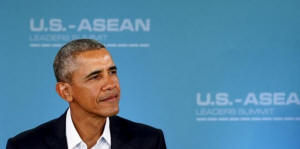|
 South
China Sea takes center stage at U.S.-ASEAN summit South
China Sea takes center stage at U.S.-ASEAN summit
 Send a link to a friend
Send a link to a friend
[February 16, 2016]
By Jeff Mason and Bruce Wallace
RANCHO MIRAGE, Calif. (Reuters) - U.S.
President Barack Obama and allies from Southeast Asia will turn their
attention to China on Tuesday on the second day of a summit intended to
improve commercial links and provide a united front on maritime disputes
with Beijing.
|
|
 After a first day focused on trade and economic issues, Obama and
his counterparts from the Association of Southeast Asian Nations
(ASEAN) will try to arrive at a common position on the South China
Sea during a second day of talks at Sunnylands, a California resort. After a first day focused on trade and economic issues, Obama and
his counterparts from the Association of Southeast Asian Nations
(ASEAN) will try to arrive at a common position on the South China
Sea during a second day of talks at Sunnylands, a California resort.
China and several ASEAN states have conflicting and overlapping
claims in the South China Sea, but not all the Southeast Asian
nations agree on how to handle them.
U.S. officials want the summit to produce a statement calling for
China to follow international law and handle disputes peacefully.
"We will be continuing to work with our ASEAN partners on a
potential statement that we might issue together," White House
national security adviser Susan Rice told reporters on Monday.

"We obviously have issued such statements in the past with ASEAN,
and in it we consistently underscore our shared commitment to a
peaceful resolution of disputes, freedom of commerce and navigation,
the rule of law, and the necessity of disputes being resolved
through peaceful, legal means."
Obama is expected to address the issue during a news conference at
the conclusion of the summit around 1:30 PST (2100 GMT.)
Though China dominated the summit, the White House emphasized
non-China related aspects, such as strengthening commercial ties.
The chief executives of IBM, Microsoft and Cisco were brought into
Monday’s private sessions with the leaders to help make the point.
[to top of second column] |

"The potential for deepening our economic engagement is tremendous,"
U.S. Commerce Secretary Penny Pritzker said. Monday’s discussions
with the "private sector partners" ranged from the need for capital
to creating an entrepreneurial culture in Asia that is prepared to
tolerate business failure.
But even business leaders were watching the South China Sea issue.
"What keeps us up at night is that one of the big tension areas is
the South China Sea," said Alexander Feldman, president of the U.S.
ASEAN Business Council.
"We would like as a business community to see those differences and
overlapping claims be addressed in a way that is done though
discussion rather than military confrontation."
(Additional reporting by David Brunnstrom, editing by Larry King)
[© 2016 Thomson Reuters. All rights
reserved.]
Copyright 2016 Reuters. All rights reserved. This material may not be published,
broadcast, rewritten or redistributed.
 |